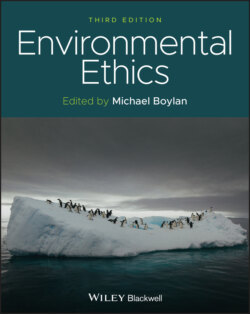Читать книгу Environmental Ethics - Группа авторов - Страница 33
Argument Two: The Moral Perspective of Human Nature Within the Environmental Perspective
ОглавлениеArgument Two, though it begins with prudential values (seen from the perspective of individual natures), transcends to the ethical when the understanding of the relationship between humans and their fundamental definition is generalized within the environmental context. This is because there is no longer an agent acting for themself only. Rather, the logical substitution instance is a generically described individual and, as such, could be understood as applicable to any substitution instance for the variable that has undergone universal generalization.
Along with some undergirding mechanism such outcomes can be projected into a law-like structure.55 This depiction of humans as situated within their environmental communities (severally understood) constitutes a fundamental structure of ethical duty.56
The Making and the Things Made. Earlier in the chapter Nature, as an existent ontological entity, was contrasted with things created by humans, “the making.” The making was connected to a process described as an art or techne. Nature was set out as primary to human making because humans do not make themselves. This assessment relies upon a principle about making: “There is a priority in making that gives priority to the maker over the artifact created (that which is made).”57 This relationship does not depend upon knowing the identity of the maker. For example, Nature (as an all-encompassing material system affecting of all living things and that which supports them) exists, and within this systemic structure, brings about the conditions whereby life and its supporting components—air, land, and water—come to be and are sustained. Humans are a part of this grand system. But Humans did not create it. It was created by some systemic material agency since by the Principle of Sufficient Reason, everything that is must owe its existence to some material, causal explanation.58 Under this account the material system, Nature, is understood to be the named entity that is responsible for our very human existence. As such, under the hierarchy of the making and the output of the making (things made), we owe a level of respect and precaution when dealing with the operation of Nature’s systems when we go about our making of artificial devices (teche => technology). In a situation in which there was a conflict between human making and the material system, Nature, the status of the latter should trump the former.59 This can be seen in Argument Three.
1 There is a priority in the process of making that puts the maker above the output of the maker: things made—A.
2 The status of priority in the process of making means that the operation of and the interests in the maker always trump the operation of and the interests in the things made—A.
3 Nature’s relation to Humans is as maker to output made—F.
4 The operation of and the interests in Nature’s systemic operation always trumps the operation of and the interests of Human’s own making—1−3.
5 The operation of and the interests in Human artifacts (technology) are always subservient to the ultimate interests of Humans—1, 4.
6 The operation of and interests in Human artifacts (technology) are always subservient to the operation of and interests in Nature’s systemic operation—4, 5.
